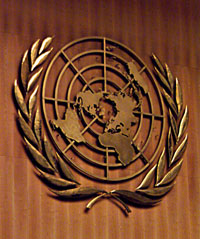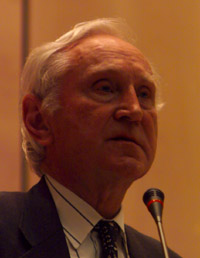 |
|

|
The Europe and North America Regional Ministerial Meeting for the World
Summit on Sustainable Development, WSSD, opened on Monday, 24
September 2001 in Geneva, Switzerland. Ministers
from 54 UN Economic Commission for Europe (UNECE) member
governments attended the meeting, as well as representatives of
governments, intergovernmental organizations, NGOs and other major
groups and stakeholders. The
meeting discussed UNECE Ministerial Statement to the WSSD both in
Plenary and in a break-out group focused on drafting, and
considered follow-up to the High-level Meeting on Transport,
Environment and Health |
|
*
To view PDF files,  you
will need the free Adobe Acrobat Reader. you
will need the free Adobe Acrobat Reader.
 *
To listen to Real Audio files, you will need the free Real
Audio player. *
To listen to Real Audio files, you will need the free Real
Audio player.
|
|
|
|
|
|
|
Klaus
Töpfer, Executive
Director of the United Nations Environment Program, drew attention
to terrorism, urging that the World Summit on Sustainable
Development (WSSD) seek to tackle its underlying causes. The goal
of the Summit, he stressed, is cooperation around the world to
overcome poverty in a responsible way. He highlighted growing
integration of efforts, from Stockholm's focus on environment,
to Rio's focus on environment and development, to
Johannesburg's on Sustainable Development. He also highlighted
the increased integration of valuable inputs from civil society
and business. He stressed that eliminating poverty, meeting social
needs and decoupling economic growth are key to resolving
environmental problems, and urged reversing the decline in
development assistance. To be successful, he noted, the Summit
should lead to a new global deal that meets the needs of
developing countries. He called for: acknowledgement of common and
differentiated responsibilities; support for good governance;
development and transfer of clean technologies; opening of markets
to products from the South; responsible use of science and
precaution; enhancement of compliance and enforcement regimes; and
expanded access to information. He concluded that the road to
Johannesburg will not be easy
 Listen
to the RealAudio
Listen
to the RealAudio
|
| Joseph
Deiss welcomed meeting participants to Geneva, and highlighted
Swiss efforts to integrate sustainable development into national
policies and with regard to international cooperation. Noting the
recent terrorist attacks on the US, he stressed his country's
sympathy and solidarity with the US. He cautioned that retaliation
and force alone cannot address the roots of terrorism, and
supported a strategy of promoting sustainable development,
equality and justice between people to deal with poverty,
exclusion and desperation, and called for the preparations for
Johannesburg to proceed in this spirit. He said a message should
be sent to the global preparatory process with respect to
promotion of global equality, and said disparities within and
among countries in the region also need to be dealt with. He asked
participants to look to the future, inviting them to find
consensus and produce a meaningful contribution from the region to
the global preparatory process
 Listen
to the RealAudio
Listen
to the RealAudio
|
|
|

|
Crispin
Tickell, Chair
of the Regional Roundtable on Sustainable Development for Europe
and North America at Vail in June and representing UN DESA,
reported the results of this expert group meeting to the assembly.
He noted that the group of 30 "hardened industrialists and
greenies" reached a measure of consensus that the present
generation may be the last that can correct the course of
development to respect the environment, and that industrial
countries must take responsibility for addressing and helping
other countries address environmental, economic and social
problems. He drew attention to the Report of the G8 Renewable
Energy Taskforce and the Amsterdam Declaration from over 1000
Global Change scientists. He noted their proposals including: tax
reform, subsidies removal, new accounting rules, sustainable
consumption and wider adoption of precautionary principle, as well
as measures to deal with freshwater, oceans and seas, and land
resources. He urged the ratification of the major treaties (e.g.
climate change, POPs, Biosafety, Cartagena) and raised the possible need
for an international renewable energy agency and other
institutions to support sustainable development. He stressed the
need to bring Sustainable Development into education and
underscored the special responsibilities of Europe and North
America, calling for action
 Listen
to the RealAudio
Listen
to the RealAudio
|
| Danuta
Lübner, Executive Secretary of ECE and UN
Under-Secretary-General, looked back at the ten years since Rio,
noting that without the meeting much less would have been
achieved. She highlighted achievements and failures with regard to
sustainable development in the region, based on the Assessment of
Progress in Sustainable Development since Rio 1992 for Member
States of UNECE, which was prepared by UNECE and the UNEP Regional
Office for Europe. She said the greatest changes have taken place
in the economies in transition (EITs), with poverty, unemployment,
wide income distribution and corruption, and the emergence of a
new foundation for economic growth, democracy and civil society at
the positive side. On the situation today, she presented a mixed
picture. |
|
| She
highlighted the integration of environmental concerns in
decision-making in all sectors of society as a crucial theme in
Rio, stressed the importance of decoupling economic growth from
resource use, and called for more local Agenda 21 action and more
impact of NGOs. She stressed the UNECE Convention on Access to
Information, Public Participation in Decision-making and Access to
Justice in Environmental Matters (the Aarhus Convetion) as a legal
breakthrough with regard to public involvement and called for its
effective implementation as it enters into force on 30 October
this year. She called for effective mobilization of resources and
achievement of the 0.7 ODA target. She highlighted the UNECE
preparation for the WSSD, introduced the draft Ministerial
Statement, and said the preparations build on ongoing processes
such as the Ministerial "Environment for Europe," with the
next meeting taking place in Kiev, Ukraine in 2003. She also
highlighted regional cooperation on transport, environment and
health, forests and sustainable energy, as well as regional
conventions and protocols. She concluded by noting that much
remains to be done on the road to a sustainable future and called
for new political impetus to make sustainable development more
effective and consistent
 Listen
to the RealAudio
Listen
to the RealAudio
|
| Oliver
Deleuze, Belgium,
on behalf of the EU, underscored solidarity with the American
people. He stressed the need for a high level of ambition for the
WSSD leading to agreement on a forward-looking, action-oriented
agenda accelerating implementation of the Rio commitments. He
called for the reaffirmation of the Millennium Declaration and
development targets, and stressed the overarching goals of
sustainable production and consumption and poverty eradication for
WSSD. He stressed the need to decouple economic growth from
environmental degradation and called on all nations to ratify the
Kyoto Protocol, allowing its entry into force by 2002. He noted
both the opportunities and related to globalization, and stressed
the international environmental governance process. He called for
a global deal at Johannesburg and welcomed dialogue between the
ECE and other regional preparatory processes
 Listen
to the RealAudio
Listen
to the RealAudio
|
|
|
|
Hendrik
Vygen, Germany, stressed the link between poverty and
environment, and supported sustainable energy development in this
context. He favored a strong statement on renewable energy, and
also stressed water as a key issue, noting that Germany will host
a conference on fresh water prior to the WSSD. He said the
response to globalization of the economy should be global
environmental and social targets
 Listen
to the RealAudio
Listen
to the RealAudio
|
|
|
|
|
| Serhii
Kurykin, Ukraine,
stressed the principle of sustainable development as a key element
of modern culture, noting that the principle has often not
received enough political support in the NIS. He called for
reference to debt-for-environment-swaps and the polluter pays
principle in the draft Ministerial Statement
 Listen
to the RealAudio
Listen
to the RealAudio
|
|
|
Kalman
Mizsei,
UNDP,
identified as the primary focus of his organization the
implementation of development, and through its offices in 130
countries, and capacity building. Its programs include: Capacity 21;
developing Agenda 21 strategies at the national and local levels;
linking environment to poverty reduction; and assisting countries in
crisis prevention and recovery. UNDP seeks to implement development
for a sustainable peace |
|
|
|
Nándor
Vass, Hungary,
stressed that as the ECE regional meeting was the first, other
regions would pay attention to its outcomes. He stressed the
responsibility of the ECE region to achieving sustainability and
aiding developing countries. He called for improvement of
integrated decision-making at all levels
 Listen
to the RealAudio
Listen
to the RealAudio
|
|
Daniel
Mitller, Friends of the Earth International, drew
attention to the shortfalls identified by the UNECE assessment of
Sustainable Development in Europe. Turning to the Draft Ministerial
Declaration, he noted that precaution and aid commitments are being
left out. Citing a lack of political will for clear targets and
timetables, he pointed to the march of economic globalisation and
excessive corporate influence on government decision making, he
postulated that efficiency gains would be offset by increasing
volumes of consumption. He described FOE-I's priorities heading to
Johannesburg : a review of trade agreements to ensure that social
and environmental needs are met; regulation to make corporations
more accountable; recognition of ecological debt and reduced
resource consumption; enhanced environmental governance; and
negotiations on environmental human rights
 Listen
to the RealAudio Listen
to the RealAudio
|
|
| Achieving
sustainable development in the ECE region, according to Elaine
Price,
World Health Organisation, requires addressing the
interlinked problems of health and poverty. She called poverty the
largest determinant of ill health, as it generates increased
personal and environmental risk, and ill health decreases
productivity. Pointing to the problems of unsafe water and lack of
sanitation, she urged mobilizing resources to tackle these
problems through coherent activities
 Listen
to th RealAudio Listen
to th RealAudio
|
|
|
|
Kjell
Larsson, Sweden,
highlighted the message from a Youth Meeting on environment held
in Sweden, calling for decisive action at Johannesburg. He
stressed the importance of the precautionary principle, which he
said should be further developed and applied in all MEAs, and
underscored that the international trading system should play an
active role in paving the way for sustainable development and
called for such an outcome at Doha |
|
 Danuta
Lübner, UN
Undersecretary General, reported the results of the High Level
Meeting on Transport, Environment and Health Danuta
Lübner, UN
Undersecretary General, reported the results of the High Level
Meeting on Transport, Environment and Health
|
|
|
The
representatives of the Dutch National Youth Council pointed
out that youth are most concerned about globalisation, climate
change, overconsumption, finance and governance, and offered
balanced proposals for addressing their concerns. Reporting the
results of the Borgholm Youth Conference on Environment and
Sustainable Development, 23-27 May, 2001, the pair pointed to the legitimate
concerns of hundreds of thousands of peaceful protesters. They
urged implementing a global convention to enhance accountability
of transnational corporations; increasing to 10% the share of
renewable energy in generation; promoting public transit and
cycling; eliminating perverse subsidies; educating youths and
adults; strengthening the multilateral environmental agreements
and liability system; utilizing the 'ecological footprint' for
national accounting; and meeting international aid targets |
|
|
|



